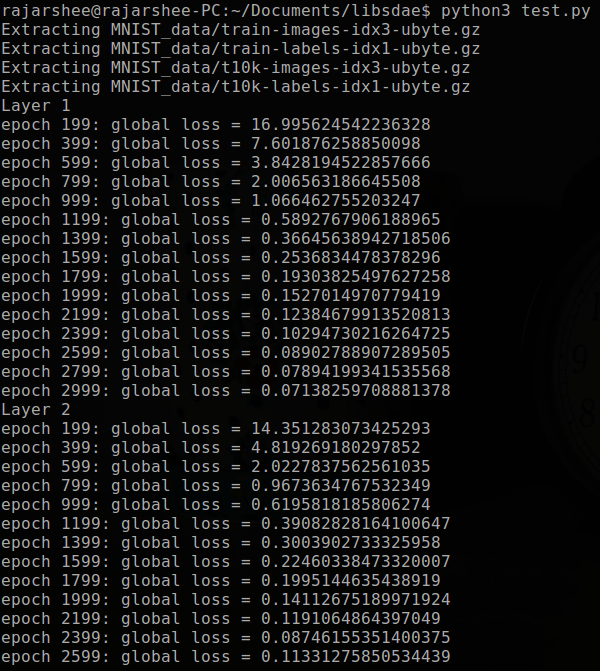rajarsheem / Libsdae Autoencoder Tensorflow
Licence: mit
A simple Tensorflow based library for deep and/or denoising AutoEncoder.
Stars: ✭ 147
Programming Languages
python
139335 projects - #7 most used programming language
Labels
Projects that are alternatives of or similar to Libsdae Autoencoder Tensorflow
Segmentation
Tensorflow implementation : U-net and FCN with global convolution
Stars: ✭ 101 (-31.29%)
Mutual labels: autoencoder
Lstm Autoencoders
Anomaly detection for streaming data using autoencoders
Stars: ✭ 113 (-23.13%)
Mutual labels: autoencoder
Pt Dec
PyTorch implementation of DEC (Deep Embedding Clustering)
Stars: ✭ 132 (-10.2%)
Mutual labels: autoencoder
Gpnd
Generative Probabilistic Novelty Detection with Adversarial Autoencoders
Stars: ✭ 112 (-23.81%)
Mutual labels: autoencoder
Rectorch
rectorch is a pytorch-based framework for state-of-the-art top-N recommendation
Stars: ✭ 121 (-17.69%)
Mutual labels: autoencoder
Zerospeech Tts Without T
A Pytorch implementation for the ZeroSpeech 2019 challenge.
Stars: ✭ 100 (-31.97%)
Mutual labels: autoencoder
Tensorflow Mnist Cvae
Tensorflow implementation of conditional variational auto-encoder for MNIST
Stars: ✭ 139 (-5.44%)
Mutual labels: autoencoder
Pytorch cpp
Deep Learning sample programs using PyTorch in C++
Stars: ✭ 114 (-22.45%)
Mutual labels: autoencoder
Tybalt
Training and evaluating a variational autoencoder for pan-cancer gene expression data
Stars: ✭ 126 (-14.29%)
Mutual labels: autoencoder
Repo 2016
R, Python and Mathematica Codes in Machine Learning, Deep Learning, Artificial Intelligence, NLP and Geolocation
Stars: ✭ 103 (-29.93%)
Mutual labels: autoencoder
Smrt
Handle class imbalance intelligently by using variational auto-encoders to generate synthetic observations of your minority class.
Stars: ✭ 102 (-30.61%)
Mutual labels: autoencoder
Kate
Code & data accompanying the KDD 2017 paper "KATE: K-Competitive Autoencoder for Text"
Stars: ✭ 135 (-8.16%)
Mutual labels: autoencoder
Deep Autoencoders For Collaborative Filtering
Using Deep Autoencoders for predictions of movie ratings.
Stars: ✭ 101 (-31.29%)
Mutual labels: autoencoder
Focal Frequency Loss
Focal Frequency Loss for Generative Models
Stars: ✭ 141 (-4.08%)
Mutual labels: autoencoder
Splitbrainauto
Split-Brain Autoencoders: Unsupervised Learning by Cross-Channel Prediction. In CVPR, 2017.
Stars: ✭ 137 (-6.8%)
Mutual labels: autoencoder
Srl Zoo
State Representation Learning (SRL) zoo with PyTorch - Part of S-RL Toolbox
Stars: ✭ 125 (-14.97%)
Mutual labels: autoencoder
libsdae - deep-Autoencoder & denoising autoencoder
A simple Tensorflow based library for Deep autoencoder and denoising AE. Library follows sklearn style.
Prerequisities & Support
- Tensorflow 1.0 is needed.
- Supports both Python 2.7 and 3.4+ . Inform if it doesn't.
Installing
pip install git+https://github.com/rajarsheem/libsdae.git
Usage and small doc
test.ipynb has small example where both a tiny and a large dataset is used.
from deepautoencoder import StackedAutoEncoder
model = StackedAutoEncoder(dims=[5,6], activations=['relu', 'relu'], noise='gaussian', epoch=[10000,500],
loss='rmse', lr=0.007, batch_size=50, print_step=2000)
# usage 1 - encoding same data
result = model.fit_transform(x)
# usage 2 - fitting on one dataset and transforming (encoding) on another data
model.fit(x)
result = model.transform(np.random.rand(5, x.shape[1]))
Important points:
- If noise is not given, it becomes an autoencoder instead of denoising autoencoder.
- dims refers to the dimenstions of hidden layers. (3 layers in this case)
- noise = (optional)['gaussian', 'mask-0.4']. mask-0.4 means 40% of bits will be masked for each example.
- x_ is the encoded feature representation of x.
- loss = (optional) reconstruction error. rmse or softmax with cross entropy are allowed. default is rmse.
- print_step is the no. of steps to skip between two loss prints.
- activations can be 'sigmoid', 'softmax', 'tanh' and 'relu'.
- batch_size is the size of batch in every epoch
- Note that while running, global loss means the loss on the total dataset and not on a specific batch.
- epoch is a list denoting the no. of iterations for each layer.
Citing
- Stacked Denoising Autoencoders: Learning Useful Representations in a Deep Network with a Local Denoising Criterion by P. Vincent, H. Larochelle, I. Lajoie, Y. Bengio and P. Manzagol (Journal of Machine Learning Research 11 (2010) 3371-3408)
Contributing
You are free to contribute by starting a pull request. Some suggestions are:
- Variational Autoencoders
- Recurrent Autoencoders.
Note that the project description data, including the texts, logos, images, and/or trademarks,
for each open source project belongs to its rightful owner.
If you wish to add or remove any projects, please contact us at [email protected].

